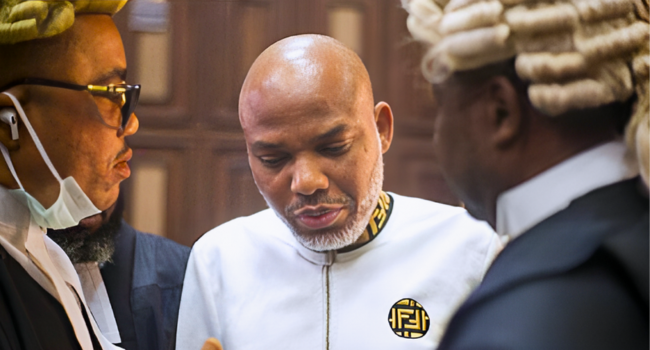Justice James Omotosho of the Federal High Court in Abuja has dismissed the fundamental human rights lawsuit filed by Nnamdi Kanu, the detained leader of the Indigenous People of Biafra (IPOB), against the Federal Government.
Kanu sought ₦1bn in damages from the Attorney-General of the Federation and the Department of State Services (DSS) for alleged violations of his rights. He claimed that the DSS and its director general interfered with his right to a fair hearing by allegedly obstructing his lawyers’ access to him during his detention and preparing for his defense in his criminal case.
In his judgment, Justice Omotosho ruled that Kanu failed to provide credible evidence to support his claims that his interactions with his lawyers were obstructed, that he was denied unrestricted access to them, and that DSS officials eavesdropped on his conversations with his legal team, thereby breaching his right to a fair hearing.
Justice Omotosho determined that Kanu’s assertions of being denied unrestricted access to his lawyers and having his conversations with them eavesdropped on by DSS operatives could not be substantiated.
Kanu, represented by his lawyer Aloy Ejimakor, sued the Federal Republic of Nigeria, the Attorney-General of the Federation (AGF), the DSS, and its Director General as the 1st to 4th respondents, respectively.
In his originating summons, Kanu sought eight specific reliefs.
He sought “a declaration that the respondents’ act of forcible seizure and photocopying of confidential legal documents pertaining to facilitating the preparation of his defence, which were brought to him at the respondents’ detention facility by his lawyers, amounted to denial of his rights to be defended by legal practitioners of his own choice.”
He also sought a declaration that the respondents’ act of preventing his counsel from taking notes on the details of counsel’s professional discussions/consultations with him at DSS detention was unlawful.
He further sought a declaration that the respondents’ act of eavesdropping on his confidential consultations/conversations with his lawyers amounted to a denial of his right, among others.
Kanu, therefore, sought an order of injunction restraining and prohibiting the respondents from their act of forcible seizure, and photocopying of confidential legal documents brought to him at the detention facility by his lawyers.
He also sought an order mandating the respondents to jointly and severally pay the sum of ₦1bn as damages for the mental, emotional, psychological, and other damages he suffered as a result of the breach of his rights, among others.
In a counter-affidavit, the DSS denied the allegations made against it by Nnamdi Kanu. The affidavit, sworn by Yamuje Benye, a staff member of the DSS legal department, refuted 11 paragraphs of Kanu’s claims as untrue.
Benye stated that Kanu was held in a safe and secure facility by the DSS and was not in solitary confinement. He asserted that Kanu had unrestricted access to his family members and legal team on designated visiting days.
Benye argued that Kanu was allowed to consult and interact with his lawyers without any interference during these visits. He emphasized that no DSS personnel had ever seized or confiscated documents brought to Kanu by his lawyers or any other individual.
Benye affirmed that DSS staff never hindered Kanu’s lawyers from performing their professional duties, including discussing, consulting, and interacting with their client.
“The applicant has consistently requested that various prayer books and religious materials be brought to him as part of his fundamental human rights,” Benye stated.
He added that Justice Binta Nyako, who presides over Kanu’s criminal trial, has always insisted that visits to Kanu be supervised, as is standard practice worldwide.
According to Benye, Kanu and his counsel were allowed to consult and interact on visiting days in one of the DSS’s best interview facilities, ensuring maximum comfort for both the applicant and his visitors.
The official denied allegations that personnel recorded interactions during visits, stating, “There is no basis for eavesdropping and recording of their conversations.”
He explained that, in line with the State Security Service’s Standard Operating Procedure (SOP), all visitors to the facility undergo routine security checks, and items in their possession are scanned to prevent unauthorized materials from entering the facility.



